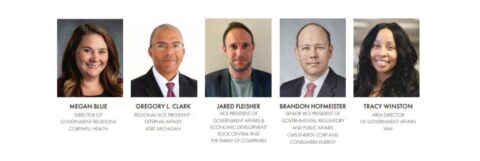BRANDON HOFMEISTER: The Consumers Energy Clean Energy Plan will eliminate coal and dramatically boost renewable energy to help achieve net zero carbon emissions by 2040. Our plan will add 8,000 megawatts of competitively bid, utility-scale solar power by 2040 — when solar power will comprise more than half of our electric capacity. It’s a big goal. We want to work with landowners, state elected officials and local leaders throughout Michigan interested in siting solar power plants.
TRACY WINSTON: PFAS is one of our top legislative priorities. As a passive receiver of PFAS it is integral to our industry and Michigan’s environment to monitor how the State of Michigan chooses to deal with PFAS and its impact on Michigan. Other high priorities include right-to-work, taxation, equal pay, permit fees, and environment regulations; these policy issues directly impact WM.
What should the legislature focus on to improve Michigan’s business climate and drive economic growth?
MB: Workforce shortages continue to be a pain point for Corewell Health, and we are not alone. We encourage creative solutions to retain and attract workers into the state, especially in healthcare. Creating a talent pipeline and incentives for young students to explore the health field is vital statewide. Doing so will build a strong economic foundation for the future with younger generations accessing stable, well-paid positions within health systems devoted to the long-term health of Michiganders.
GC: Digital equity and inclusion. Ensure that all individuals can participate fully in society and the economy, including access to affordable information technologies. This also includes digital literacy training, and digital skilling, especially on cybersecurity, so all citizens can safely participate in the information economy. Promote digital equity and inclusion, especially among populations that have lower than average broadband adoption rates.
JF: Growing Michigan’s population requires a combination of creating/attracting quality jobs and building the vibrant urban places that give people a compelling reason to stay in Michigan and move to Michigan.
In short, we need to focus on community development and city-building at the same time as we focus on creating/attracting the jobs of the future. Talent wants to live in a high quality place, and businesses are created— and want to locate—where talent resides. City-building and community development create a virtuous cycle that works hand-in-hand with direct business attraction and job creation strategies.
BH: Traditionally, economic development conversations center around rates, location and workforce readiness. Now, we see clean energy being an important consideration – companies want to know Michigan and energy providers are ready and engaged to help them meet their sustainability goals – to compete with other states for industries of the future like batteries, electric vehicles and semiconductors.
TW: One area the Legislature should continue to focus on is building a pool of resources for businesses to thrive in Michigan that include local workforce/ talent retention, a talent pipeline, and workforce development. Secondly, enriching resources that Michigan employees value like education, health care, standard of living, quality of life experiences to keep and attract Michiganders in Michigan.

